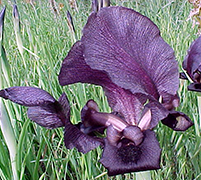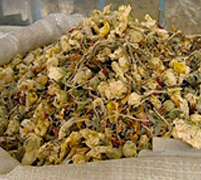Jordan - The Plants
The medicinal uses of Jordan's desert plants have been tested and refined over thousands of years. For example, Mediterranean gourds called "Colocynth" or "Hanzal" in Arabic, were used as medicine by the Greeks and Romans. Today, pharmacological research is confirming their effectiveness in treating diabetes.
Deserts plants in Jordan grow in a largely undeveloped desert roughly the size of North Dakota called The Badia (pronounced BAH-dee-ah). The Badia makes up 80 percent of Jordan and reaches into Syria, Iraq, and Saudi Arabia.

Dr. Sawson Oran - The Black Iris, Jordan's national flower, has powerful medicinal properties.
To survive here a plant needs deep roots and stamina. With an average annual rainfall of only 2 to 8 inches, seeds can lie dormant for months, even years, waiting for rain. When it comes, usually in the spring, there is an explosion of bloom and new growth.
Bedu collects wild plants and uses nearly 170 plant species to treat everything from colds and skin disorders to bites and stings.
For example, Artemisia (Alba or Wormwood, as it is commonly called in English) is used to treat bad colds and stomach aches. Often the Artemisia is boiled into a tea and used as a general health tonic. Different parts of the plant can also be used to successfully treat diabetes. If a family collects more than they need for the year, they will often sell it to the herbalist.
By observation, the Bedu have found that sheep will eat this plant when they are ill with stomach worms. The plant will kill the worms found in sheep.
Chamomile is often used by the Bedu in treating cancer, skin diseases, or stomach upsets. But only through scientific investigation can we discover the compound responsible for making these treatments effective.

Work at the University of Jordan by Dr. Sawson Oran has shown that several wild Jordanian plants can inhibit the growth of tumors in plants. Dr. Oran is especially excited about a breakthrough with a plant called Globularia, from the south of the country.
Results from tests done with globularia extract show that it inhibits tumors on potatoes 85% of the time. That anti-leukemic result is so strong that further trials are now being done with animals.
Dr. Oran dreams of helping to cure leukemia in humans. She says "If these plants prove to be successful in curing leukemia, I will feel I have achieved a major victory. It will be the most important thing I have ever done in my life and I will just feel great about it!"
For more information about this website.
Contact the webmaster to report any problems with this site.
New Mexico State University is an equal opportunity/affirmative action employer and educator. NMSU and the U.S. Department of Agriculture cooperating.